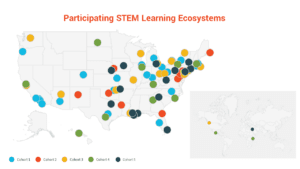Communities, including entire states, join collaborative education movement; New Ecosystems eager to change the way students learn, educators teach
(New Orleans — April 3, 2019 –) The STEM Learning Ecosystems Community of Practice, SLECoP, today announced it has selected 15 new ecosystems to join the global movement of leaders devoted to dramatic improvement in how students learn.
This 20 percent growth underscores national recognition of the importance of ecosystems, which build meaningful connections among community partners to prepare students for the opportunities and challenges of the future.
New ecosystems to join the SLECoP range from the entire states of Iowa, Texas, South Carolina and West Virginia to regions like Biloxi, Miss., Broward County, Fla., Central Mass. and Lincoln, Neb.
More than 50 ecosystems from multiple countries expressed interest in joining Cohort Five, but only 15 were admitted now. Ecosystems can apply again for admission into Cohort Six in late summer.
 “This was an incredibly competitive process, and we were only able to admit ecosystems who would be capable of making immediate contributions to our thriving community of practice,” said Jan Morrison, president and founding partner of TIES, the organization that operates the SLECoP. “The ecosystems that we selected now have pulled together diverse partners who no longer accept the status quo in education; they want to see all students access high quality STEM education that will prepare them for life and work in the next century.”
“This was an incredibly competitive process, and we were only able to admit ecosystems who would be capable of making immediate contributions to our thriving community of practice,” said Jan Morrison, president and founding partner of TIES, the organization that operates the SLECoP. “The ecosystems that we selected now have pulled together diverse partners who no longer accept the status quo in education; they want to see all students access high quality STEM education that will prepare them for life and work in the next century.”
The STEM Learning Ecosystems Community of Practice, SLECoP, is a global initiative of innovators who know that thriving communities are built through collaboration and a willingness to reimagine education and provide opportunities to those commonly neglected.
The SLECoP will now include ecosystems from 38 states in the United States as well as Kenya, Israel, Mexico and Canada.
Forming STEM ecosystems was listed as the No. 1 priority in a December 2018 report by the Federal Office of Science and Technology Policy intended to help guide STEM policy and implementation across the country.
“We are starting to see a deeper appreciation for the ecosystem approach to STEM education. We are thrilled to be leading this critical work,” Morrison said.
Because of such strong demand, the SLECoP, in its fifth year, is now accepting new ecosystems twice a year, instead of only once.
The SLECoP was built on the fundamental belief that learning happens everywhere, not just in traditional classrooms. Consequently, ecosystems are made up of partners representing K-12 public and private education, business and industry, after-school providers, non-profits, STEM-rich institutions, government and philanthropy.
Ecosystem partners work for shared goals of improved STEM opportunities for all. Ecosystems also recognize the importance of identifying needed skills for an economy yet to be conceived and lobbying for informed policies to meet 21st century needs.
The SLECoP offers the architecture and support for the ecosystems to connect to one another, learn and share best practices.
The SLECoP is supported by numerous funders and partners, including Amgen Foundation, Broadcom Foundation, Burroughs Wellcome Fund, Carnegie Corporation of New York, Overdeck Family Foundation, Qualcomm Foundation, Samueli Foundation, STEM Funders Network, STEM Next Opportunity Fund, TGR Foundation, The Charles and Lynn Schusterman Foundation, The Gordon and Betty Moore Foundation, The Steinman Foundation, and countless local/regional foundations supporting local and regional STEM ecosystems.
Other support is being offered by partners, including LEGO Education, Tallo, Pitsco Education and Vernier.
New ecosystems are:
| Be’er Sheva | Israel |
| Biloxi STREAMing | Mississippi |
| Broward Area STEM Ecosystem (BASE) | Florida |
| Central Massachusetts STEM Network Ecosystem | Massachusetts |
| ENGINE of Central PA, Empowering Next Generation of Innovators and Entrepreneurs | Pennsylvania |
| First2 Network | West Virginia |
| Greater Bridgeport STEM Learning Ecosystem | Connecticut |
| Greater New Orleans STEM Network (GNOSN) | Louisiana |
| HSMC (Hunterdon County, Somerset County, and Mercer County) Tri-county STEM Ecosystem Consortium | New Jersey |
| Iowa Governor’s STEM Advisory Regional STEM Hub Network | Iowa |
| Lincoln STEM Ecosystem (LNKSE) | Nebraska |
| Northshore STEM Coalition | Louisiana |
| Northwest Arkansas STEM Ecosystem | Arkansas |
| NY Capital Region STEM Hub | New York |
| South Carolina’s STEM Ecosystem Community of Practice | South Carolina |
| Texas EcosySTEM | Texas |
Learn more about the national initiative at stemecosystems.org. Address specific questions to info@stemecosystems.org. Join online conversations on Twitter @STEMecosystems and #STEMecosystems and on Facebook, Instagram, and LinkedIn.
###


